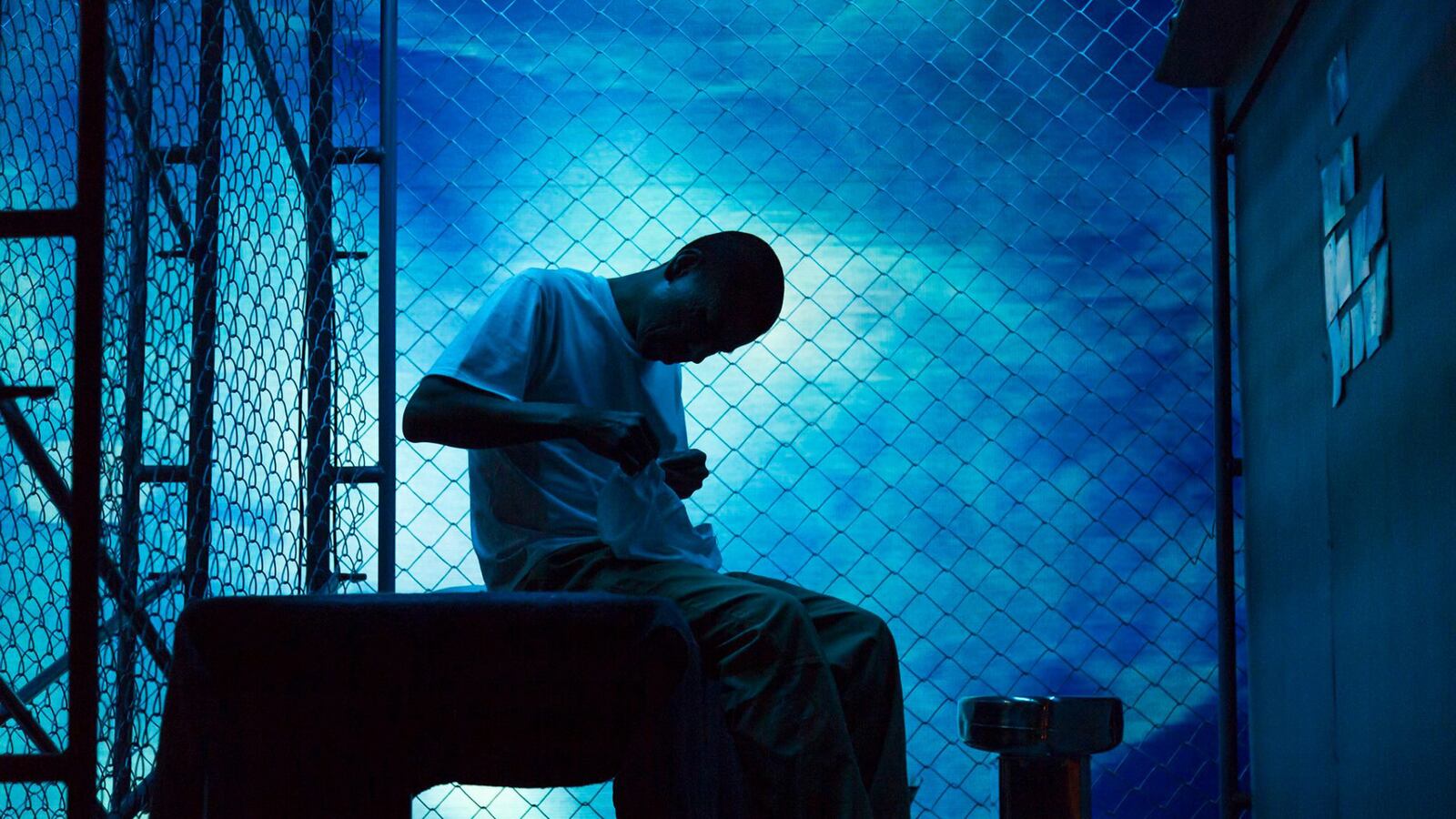Sometimes when Sarah Shourd met with prisoners, looking at them through a thick pane of glass or in a cage, both of them would just start laughing because they were so excited they had managed to connect.
“It’s pretty empowering to defy a draconian and opaque system,” Shourd said, recounting how she once took a plane to New Jersey, then a train, then the town’s only taxi to the prison to visit someone there. “I asked him to tell me a joke, and he told me this hilarious joke. Then I took it back through a snowstorm and worked it into this play, so soon 5,000 people could be laughing at his joke.”

The play Shourd is talking about, The Box is at San Francisco’s Z Space, and plays through the end of the month.
Shourd knows firsthand about solitary confinement having spent 410 days in solitary in a prison in Iran after she and two companions were arrested in Iran in 2009 and accused of being spies.
Shourd tapped into her own experience in prison to write The Box, along with corresponding with people in solitary and visiting 13 prisons around the country to talk with people locked up there, as well as their families and prison officials.
The play’s characters, as its publicity notes elucidate, “make their journeys against all odds: from racist to revolutionary, from tough-guy to suicide victim, from guru/teacher to frightened, lost soul, and from father to friend.”
Shourd, who calls herself primarily a journalist, says colleagues at web project Solitary Watch—where she is a contributing editor—knowing about her background in agitprop theater, suggested she write a play.
She wasn’t allowed to bring a pen and paper into the prisons, so she would spend hours in her car afterwards, writing notes. Shourd, who co-wrote a memoir, A Sliver of Light: Three Americans Imprisoned in Iran, says this play gives her the freedom to tap into what’s universal--the need for human connection.

That need is so profound that even in solitary people find it. Shourd says she and other women in her prison would yell back and forth. She thought the system she devised of sending notes with another prisoner, involving maxi pads, a stolen pen, and knocks on the wall was ingenious—but during her interviews with other prisoners she heard about all kinds of ways of communicating, including flushing notes or sailing them under doors.
When Shourd’s interrogators told her she might not ever get out, she went back to her cell, sat in the corner, and heard some screaming.
“I thought, ‘Whoever is screaming, I need them to stop, I can’t listen to it anymore,’” she said. “The guards burst into my cell and I realized it was me screaming. I saw myself in that moment and I thought other people have gotten through this--there must be a way and I’m going to find it. From that point on I had a completely disciplined regime. It was about not letting any idle time creep in because then despair, terror, and doubts just overwhelmed me.”
Part of that regime was making up stories and telling them to invisible audiences. Shourd told herself she had to change the narrative in her head that told her the experience would break her, and decide she was going to be stronger and make something meaningful out of her imprisonment.
Shourd said she didn’t want to write a play in which everyone is in solitary for their political views. She wanted to include violent characters. Carlos Aguirre plays one of them—Victor Santiago, a gang member who has murdered someone.

Aguirre, who has been teaching songwriting and improv to people who are locked up for years, says he thinks Victor is trying--to change and to be a good father--and those are the people we should focus on.
“It’s this old-school colonialism and treating people like savages,” Aguirre said. “It made me feel super-connected to my ancestry and it’s really deep for me. Whether people have done what they’re accused of or not, are we going to treat them like animals? It makes no sense from the purpose of rehabilitation. They’re there to be punished, and it isn’t useful. It’s something that needs to be talked about.”
Another actor in the play, Chris Herbie Holland, plays Rocky, a kid who’s been shuffled in and out of foster care. Holland, an activist in New York, agrees it needs to be talked about.
“These are people, often of color, whose bodies serve as fuel for the empire we live in today,” he said. “These bodies are often left out of the dialogue as to how we make a better world.”
The director of The Box, Michael John Garcés, says Shourd has managed to find the drama in what he calls society’s profoundly disturbing way of cutting people off from human contact.
“She has a real sense of authenticity of voice and an understanding of these men because of her own experience and her sensitivity and empathy as a writer and interviewer,” Garcés said. “This is essentially a play about a group of people who try and become activated, and she handles that journey well.”
Garcés says he’s been pushing the actors in what is an emotionally exhausting play.
“It’s really hard to imagine what these people go through,” he said. “But that is our task to imagine it and to create it on stage.”
Shourd is hoping the audience will imagine it as well. That’s the power of stories, she says.
“When you hear statistics and numbers about solitary, they’re completely abstract,” she said. “Those numbers don’t have a family and they don’t have a childhood. That’s why I believe storytelling plays such a crucial role in actual lasting cultural change.”






